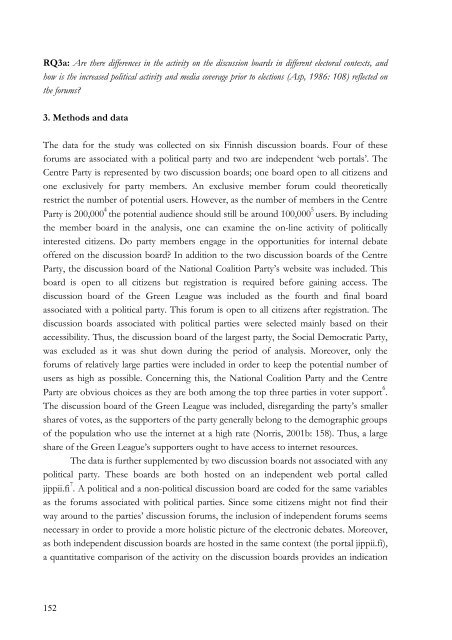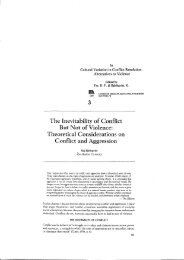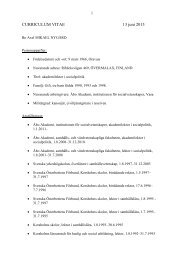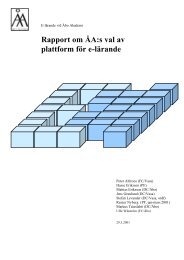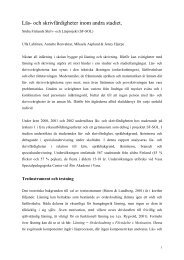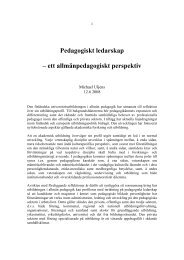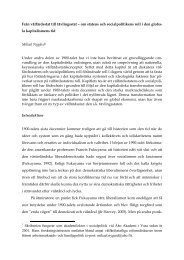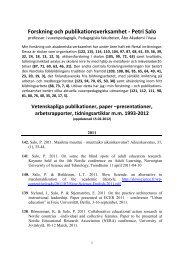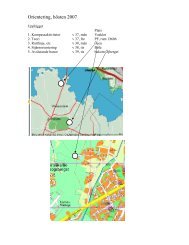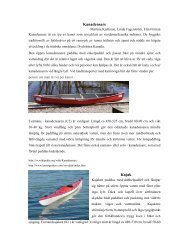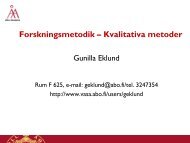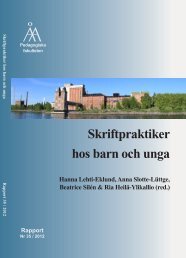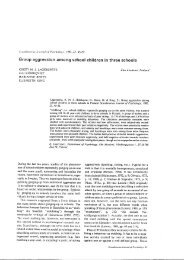Parties, Candidates and Citizens On-Line - Åbo Akademi
Parties, Candidates and Citizens On-Line - Åbo Akademi
Parties, Candidates and Citizens On-Line - Åbo Akademi
Create successful ePaper yourself
Turn your PDF publications into a flip-book with our unique Google optimized e-Paper software.
RQ3a: Are there differences in the activity on the discussion boards in different electoral contexts, <strong>and</strong><br />
how is the increased political activity <strong>and</strong> media coverage prior to elections (Asp, 1986: 108) reflected on<br />
the forums?<br />
3. Methods <strong>and</strong> data<br />
The data for the study was collected on six Finnish discussion boards. Four of these<br />
forums are associated with a political party <strong>and</strong> two are independent ‘web portals’. The<br />
Centre Party is represented by two discussion boards; one board open to all citizens <strong>and</strong><br />
one exclusively for party members. An exclusive member forum could theoretically<br />
restrict the number of potential users. However, as the number of members in the Centre<br />
Party is 200,000 4 the potential audience should still be around 100,000 5 users. By including<br />
the member board in the analysis, one can examine the on-line activity of politically<br />
interested citizens. Do party members engage in the opportunities for internal debate<br />
offered on the discussion board? In addition to the two discussion boards of the Centre<br />
Party, the discussion board of the National Coalition Party’s website was included. This<br />
board is open to all citizens but registration is required before gaining access. The<br />
discussion board of the Green League was included as the fourth <strong>and</strong> final board<br />
associated with a political party. This forum is open to all citizens after registration. The<br />
discussion boards associated with political parties were selected mainly based on their<br />
accessibility. Thus, the discussion board of the largest party, the Social Democratic Party,<br />
was excluded as it was shut down during the period of analysis. Moreover, only the<br />
forums of relatively large parties were included in order to keep the potential number of<br />
users as high as possible. Concerning this, the National Coalition Party <strong>and</strong> the Centre<br />
Party are obvious choices as they are both among the top three parties in voter support 6 .<br />
The discussion board of the Green League was included, disregarding the party’s smaller<br />
shares of votes, as the supporters of the party generally belong to the demographic groups<br />
of the population who use the internet at a high rate (Norris, 2001b: 158). Thus, a large<br />
share of the Green League’s supporters ought to have access to internet resources.<br />
The data is further supplemented by two discussion boards not associated with any<br />
political party. These boards are both hosted on an independent web portal called<br />
jippii.fi 7 . A political <strong>and</strong> a non-political discussion board are coded for the same variables<br />
as the forums associated with political parties. Since some citizens might not find their<br />
way around to the parties’ discussion forums, the inclusion of independent forums seems<br />
necessary in order to provide a more holistic picture of the electronic debates. Moreover,<br />
as both independent discussion boards are hosted in the same context (the portal jippii.fi),<br />
a quantitative comparison of the activity on the discussion boards provides an indication<br />
152


